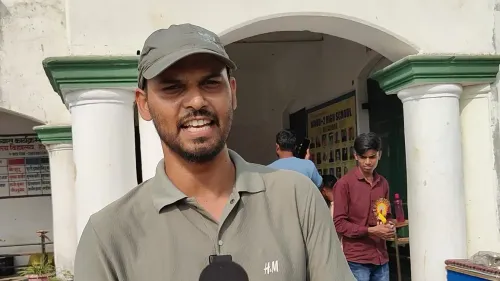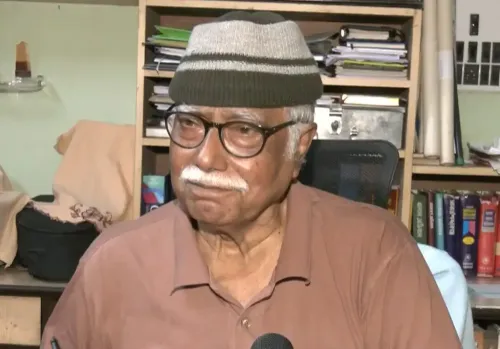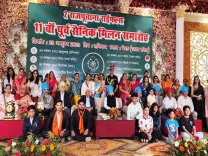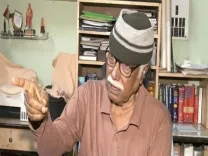PM Modi Appeals to Bangladesh's Yunus to Prioritize Minority Rights
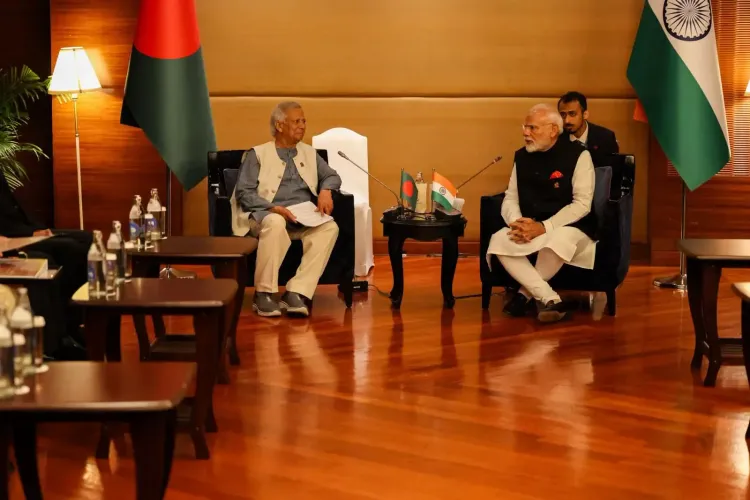
Synopsis
Key Takeaways
- PM Modi discussed minority safety in Bangladesh.
- First meeting since the interim government formation.
- Emphasized avoiding divisive rhetoric.
- Reiterated India's support for a stable and democratic Bangladesh.
- Discussions included border security and election conduct.
Bangkok, April 4 (NationPress) Prime Minister Narendra Modi on Friday addressed the critical matter of the protection and safety of minorities in Bangladesh, particularly Hindus, during his meeting with Muhammad Yunus, Chief Advisor of the interim government in Bangladesh. This meeting took place on the sidelines of the BIMSTEC Summit in Bangkok.
This marked the first direct encounter between the two leaders since the removal of the Awami League government led by former Prime Minister Sheikh Hasina and the establishment of the interim administration under Yunus last August.
Prime Minister Modi emphasized that any language that could disrupt the diplomatic atmosphere should be avoided, expressing his belief that all matters of mutual interest between the two nations would be resolved through constructive dialogue, thereby enhancing the long-established bilateral ties.
“The Prime Minister also highlighted India’s worries regarding the safety and security of minorities in Bangladesh, including Hindus, and conveyed his expectation that the Bangladesh government would ensure their safety by thoroughly investigating any incidents of violence against them,” stated Foreign Secretary Vikram Misri during a media briefing post the BIMSTEC Summit.
During the discussions, PM Modi reaffirmed India's commitment to a democratic, stable, peaceful, progressive, and inclusive Bangladesh. He stressed that India adopts a people-centric philosophy towards its relationship and pointed out the longstanding cooperation between the two nations that has provided tangible benefits to citizens of both countries.
“In this context, he reiterated to Prof. Yunus India’s intention to build a positive and constructive relationship with Bangladesh founded on pragmatism. The Prime Minister also urged that any rhetoric that could disrupt the diplomatic environment should be avoided,” added Misri.
“Regarding border issues, strict law enforcement and prevention of illegal crossings, particularly at night, are vital for maintaining border security and stability. There are various mechanisms between the two nations that could convene as necessary to evaluate and advance our relations,” remarked Foreign Secretary Misri.
Discussions also touched upon Dhaka's request for the extradition of Hasina and the conduct of elections in Bangladesh.
As PM Modi expressed his serious concern regarding the attacks on minorities, he hoped that Bangladesh would act responsibly. He also shared his views with Yunus about the importance of conducting regular and inclusive elections, which are crucial for any democracy and will ensure a stable Bangladesh in the future.
Earlier that day, Bangladesh assumed the role of the next Chair of the Bay of Bengal Initiative for Multi-Sectoral Technical and Economic Cooperation (BIMSTEC).
Formed on June 6, 1997, this regional grouping has expanded from its initial four member states—Bangladesh, India, Sri Lanka, and Thailand—to include Myanmar, Bhutan, and Nepal, facilitating regional collaboration on various issues, including healthcare.
“The PM congratulated Bangladesh on taking the lead in BIMSTEC and expressed anticipation for the forum to further enhance regional cooperation under Bangladesh's leadership. The leaders also discussed other matters and agreed to improve consultations and cooperation to foster regional integration, including under the BIMSTEC framework,” stated Misri.
Meanwhile, the Press Secretary for the Chief Advisor, Shafiqul Alam, informed Bangladeshi media that Yunus presented a photograph to Prime Minister Modi during their bilateral meeting, depicting PM Modi awarding a gold medal to Yunus at the 102nd Indian Science Congress held in Mumbai on January 3, 2015.
“All matters of mutual interest were discussed. The meeting was highly constructive, productive, and beneficial,” Alam remarked.
int/as

